Saliva keeps your oral cavity moist and aids in chewing, swallowing, digestion, and speech plays a role in the healthy functioning of your immune system. When impaired salivary function causes a dry mouth, the condition is called xerostomia. This ailment is actually more of a symptom of a number of things rather than sickness in itself. This means that people should take note of the other symptoms accompanying this problem in order to get to the root of this issue.
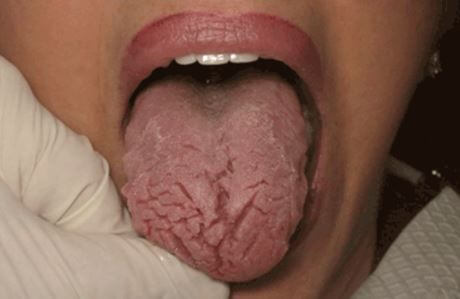
What Causes Dry Mouth?
Manifestations of decreased salivary flow can be subtle with no symptoms or severe with a myriad of symptoms. Xerostomia may result from advancing age, anemia (deficiency of hemoglobin in the blood), lack of vitamins, dehydration, diabetes, emotional stress and mechanical blockage of salivary ducts. In addition, diseases such as collagen vascular disease, ectodermal dysplasia, mumps, multiple sclerosis, and Sjogren’s syndrome can all contribute to a dry mouth. Head and neck radiation is also a chief cause; however, lately, oncologists are getting better at preserving the function of salivary glands during radiation. When Dr. Hawryluk was a resident at the University of Colorado he worked with oncologists to make dental devices to be worn during radiation sessions which helped avoid the destruction of the salivary glands. Many therapeutic drugs such as antidepressants, antihistamines, drugs controlling high blood pressure, and decongestants contribute to causing one’s mouth to be dry.
Dry Mouth Symptoms
Mild cases of xerostomia are relatively free of symptoms, and the oral tissues appear normal. In moderate cases, the tongue is dry, pale, red, and sometimes wrinkled. In severe cases, the tongue may be devoid of the papilla, appear fissured, and inflamed. The papilla is protrusions on the tongue containing taste buds. The oral tissue can appear dry, shiny and sticky, and the lips may be cracked and fissured. The stagnant rope-like accumulations of saliva on the tongue, a ‘burning tongue feel’, and alterations in taste may be present. Progression of the dry mouth may lead to bad breath, Candidia fungal overgrowth, cavities, and difficulty speaking and chewing.
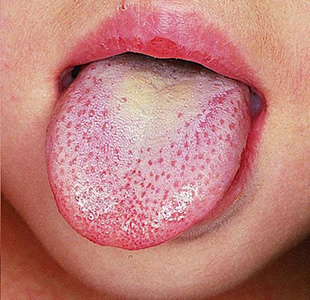
To learn more about the treatment of ‘bad breath’ from dry mouth please visit us here:
To see how to remedy dental decay bought on by dry mouth please visit us here:
Caries/Cavities Dental Treatment
Chronic dry mouth requires close supervision by your dental professional and the treatment may include a host of therapies. Since the dry mouth is a symptom and not a disease, the best possible way to prevent it is to try not to come down with any of these ailments that bring such a symptom about. Of course, this is easier said than done. While you can try to stay as healthy as you possibly can, when these ailments strike, you have no choice but to simply seek professional help for it.
Dry Mouth Treatment
Biotene
St. Lawrence Dentistry recommends the Biotene line of products to combat dry mouth. Their Moisturizing Gel, Moisturizing Mouthwash and Mouth Spray provide lubricating comfort and lasting relief. Biotène toothpaste is compounded to be gentle and non-abrasive and contains fluoride to fortify teeth and protect against dental breakdown.
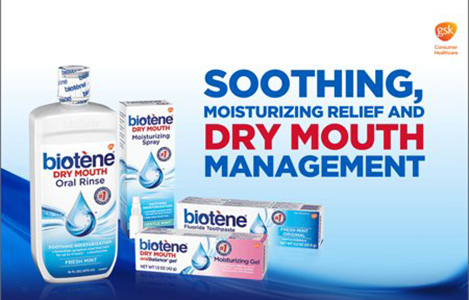
All Biotène moisturizing products have a balanced pH similar to natural saliva. Each of these products plays a different role as part of a daily routine that can help you stay moisturized throughout the day. They contain a mouth-moisturizing system that provides soothing, lubricating relief that’s gentle and alcohol-free to refresh your mouth while helping it stay clean.
Dr. Hawryluk feels the best mouthwash for people with dry mouth is Biotène Dry Mouth Moisturizing Mouthwash. This is because it contains a mouth moisturizing system which refreshes and moistens. It the same time it soothes and moisturizes your dry mouth and also freshens your breath. It is alcohol-free and can be used up to 5 times a day. If you are on the go and it is difficult to use mouthwash during the day the BIOTÈNE DRY MOUTH MOISTURIZING SPRAY may be a perfect product for you. It is also alcohol and sugar-free and soothes and moisturizes dry mouth. Out of all the Biotene line, Dr. Hawryluk feels Biotène Dry Mouth oral balance moisturizing gel is the most effective. It is the most concentrated formula in the Biotène product line, making it ideal for long-lasting relief from dry mouth and can also help sufferers swallow their food easier. Please talk to St. Lawrence Dentistry about your individual situation and they will see what product is right for you.
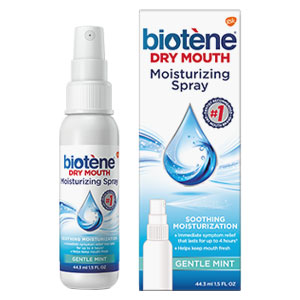
Correcting any dehydration is an important step in treating dry mouth and it is rather easy to understand why this particular condition brings about dry mouth since saliva is, after all, a fluid. Lack of fluids can be due to a number of factors, one of which is an insufficient intake of water. Loss of body fluids due to diarrhea, vomiting, and excessive sweating can also bring about dehydration, and possibly, xerostomia. To prevent dehydration St. Lawrence Dentistry recommends the ‘8×8’ rule for an ‘average-sized’ person. That is dry 8 glasses of 8 once water servings per day. The benefits of adequate water intake are far-reaching and go well beyond simply treating try mouth. This is needed for your whole body to function properly.
Mi Paste
Another common treatment for dry mouth at St. Lawrence Dentistry is the use of MI paste. The MI Paste Family are the only products for dental containing RECALDENT™ (CPP-ACP), a special milk-derived protein that releases vital minerals into your mouth (calcium and phosphate; also fluoride in MI Paste Plus). These products can also help redeposit minerals lost by the lack of saliva back into the oral environment. MI Paste and GC Dry Mouth Gel restore the normal feeling of saliva lubrication. MI Paste restores minerals such as Calcium and Phosphate to combat decay. MI Paste helps soothe and combat tooth sensitivity. Dr. Hawryluk will fabricate custom dental trays for you which can hold the MI paste right next to your teeth.
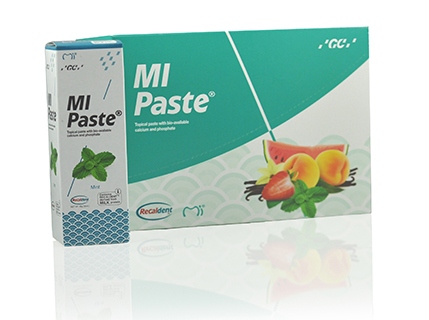
To learn more about MI paste please visit us here:
MI Paste Line of Products
Foods to Avoid When You Have Dry Mouth
When you are at St. Lawrence Dentistry we may suggest fluoride treatments to protect your teeth from decay, and advise you to stay away from food and drinks that can exacerbate a dry mouth condition. These include salty foods, alcohol, caffeinated drinks, and high sugar fare. You will also be told to chew sugarless gum to encourage saliva production, suck on ice chips, and in some cases, to use an OTC saliva substitute. Xylitol containing chewing gum is the best because it has an anti-cavity effect and saliva stimulating effect at the same time.
If your condition is brought about by the use of certain medications Dr. Hawryluk can contact your physician on your behalf to see if there are alternatives to what you are taking, citing the occurrence of dry mouth as your reason for this request. A medication called Pilocarpine (Salagen) can help stimulate your saliva flow. It works by innervating nerves to enhance the concentration of saliva you produce, creating a comfortable environment speaking and swallowing. Dr. Hawryluk can work with your medical doctor to see if this medication is right for you.
Having a dry mouth is a common condition seen at our Mississauga dental office and there are a host of treatment options. If you live in the area and would like to investigate this issue further please call our office.
- St. Lawrence Dentistry Looks Forward To St. Patrick’s Day! - March 12, 2025
- Understanding Dental X-Rays and Radiation: What You Should Know - January 13, 2025
- Happy New Year from St. Lawrence Dentistry! - December 30, 2024










